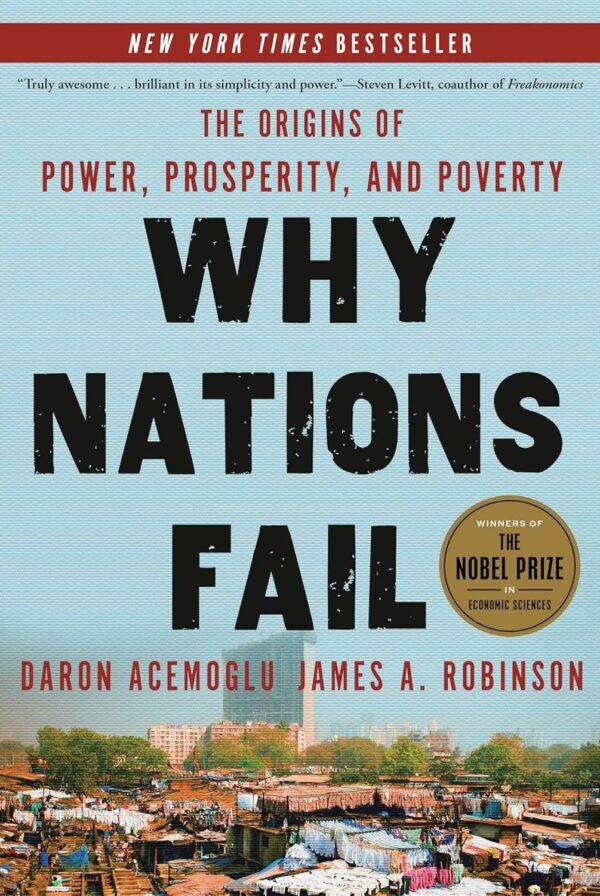Why do some nations flourish with prosperity while others languish in poverty? In this groundbreaking work, economists Daron Acemoglu and James A. Robinson tackle one of the most pressing questions of our time, challenging conventional wisdom about what drives national success. Drawing on fifteen years of original research spanning continents and centuries, they systematically dismantle popular theories that attribute national wealth or poverty to geography, culture, or simple ignorance of proper economic policies. Through meticulous historical analysis, they reveal a more fundamental truth that reshapes our understanding of global inequality.
The authors introduce a powerful framework centered on the distinction between “inclusive” and “extractive” institutions. They argue that nations succeed when they develop political systems that distribute power broadly and create economic institutions protecting property rights, encouraging innovation, and providing opportunities for the majority. Conversely, countries fail when power concentrates in the hands of narrow elites who establish extractive economic institutions designed to maintain their privileged position at the expense of societal progress. The stark contrast between North and South Korea serves as one compelling example of how identical populations and geography can yield dramatically different outcomes based solely on institutional choices.
Throughout the book, Acemoglu and Robinson take readers on a fascinating journey through human history, from the Roman Empire and Mayan city-states to the Soviet Union and modern Africa. They examine critical historical junctures where societies diverged onto different institutional paths, showing how small differences in initial conditions can lead to vastly different long-term trajectories. The Glorious Revolution of 1688 emerges as a pivotal moment that set England on a path toward inclusive institutions, ultimately enabling the Industrial Revolution and the unprecedented economic growth that followed.
The authors demonstrate how inclusive institutions create virtuous cycles of positive feedback, where economic prosperity reinforces political pluralism, which in turn strengthens economic opportunities. Meanwhile, extractive institutions generate vicious cycles where elite control stifles innovation and concentrates wealth, making societies vulnerable to collapse despite potentially impressive short-term growth. This explains why authoritarian regimes like the Soviet Union or contemporary China might experience rapid economic expansion temporarily, but ultimately cannot sustain progress without fundamental institutional change.
“Why Nations Fail” offers profound insights for understanding today’s global economic landscape and the challenges facing developing nations. Rather than prescribing technical solutions or advocating for foreign aid, the authors emphasize that sustainable development requires grassroots institutional change driven by diverse coalitions seeking broader political participation. This meticulously researched work has earned acclaim from Nobel laureates and scholars worldwide for its ambitious scope and compelling argument that continues to shape how we think about the fundamental causes of prosperity and poverty across nations.
 Influence: The Psychology of Persuasion
1 × د.م. 105,00
Influence: The Psychology of Persuasion
1 × د.م. 105,00  I Wasn't Ready to Say Goodbye
1 × د.م. 110,00
I Wasn't Ready to Say Goodbye
1 × د.م. 110,00  If He Had Been With Me
1 × د.م. 120,00
If He Had Been With Me
1 × د.م. 120,00  A Love Letter to Whiskey
1 × د.م. 175,00
A Love Letter to Whiskey
1 × د.م. 175,00  Mansfield Park
1 × د.م. 145,00
Mansfield Park
1 × د.م. 145,00  Une farouche liberté
1 × د.م. 85,00
Une farouche liberté
1 × د.م. 85,00  Romancing Mister Bridgerton (Bridgerton book 4)
1 × د.م. 150,00
Romancing Mister Bridgerton (Bridgerton book 4)
1 × د.م. 150,00  Inward
1 × د.م. 100,00
Inward
1 × د.م. 100,00  A Schooling in Murder
1 × د.م. 130,00
A Schooling in Murder
1 × د.م. 130,00  War and Peace
1 × د.م. 330,00
War and Peace
1 × د.م. 330,00  War
1 × د.م. 140,00
War
1 × د.م. 140,00  The Grapes of Wrath
1 × د.م. 145,00
The Grapes of Wrath
1 × د.م. 145,00  East of Eden
1 × د.م. 170,00
East of Eden
1 × د.م. 170,00  The Woman in the Wallpaper
1 × د.م. 150,00
The Woman in the Wallpaper
1 × د.م. 150,00  The Age of Reason
1 × د.م. 100,00
The Age of Reason
1 × د.م. 100,00 


























Reviews
There are no reviews yet.